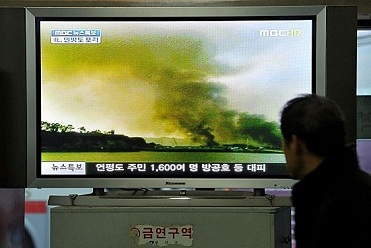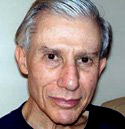Latest North/South Korean Exchange

Last March, North Korea was falsely blamed for sinking a South Korean ship, a topic an earlier article addressed, accessed through THIS link.
Seoul said there's "no other plausible explanation....The evidence points overwhelmingly to the conclusion that (a) torpedo was fired by a North Korean submarine," even though none was detected in the area.
At the time, evidence suggested a false flag, manufactured to blame the North. The incident occurred near Baengnyeong Island opposite North Korea. US Navy Seals and four US ships were conducting joint exercises in the area. The torpedo used was German, not North Korean as claimed. Germany sells none to Pyongyang. Yet it was blamed for what it didn't do, what apparently was Pentagon-manufactured mischief.
What now? According to US media reports, North Korea incited the gravest incident since the Korean War armistice. For example, on November 23, New York Times writer Mark McDonald headlined, "Crisis Status in South Korea After North Shells Island," saying:
"The South Korean military went to "crisis status" on Tuesday (11/23) and threatened military strikes after the North fired dozens of shells at a South Korean island, killing two of the South's soldiers and setting off an exchange of fire in one the most serious clashes between the two sides in decades."
America, Britain and Japan condemned the attack, the White House calling on North Korea to "halt its belligerent action and to fully abide by the terms of the Armistice Agreement."
"Analysts," said McDonald, "were quick to see the shelling as a deliberate North Korean provocation," even though South Korean forces fired first, AP reporting:
"The skirmish began when Pyongyang warned the South to halt military drills in the area, according to South Korean officials. When Seoul refused and began firing artillery into disputed waters, albeit away from the North Korean shore, the North retaliated by bombarding the small island of Yeonpyeong, which houses South Korean military installations."
A Pyongyang supreme military command statement read:
"The South Korean enemy, despite our repeated warnings, committed reckless military provocations of firing artillery shells into our maritime territory."
A November 24 McDonald article headlined, "Nerves Are Rattled in Seoul by Attack on Island," discussing the incident solely from a South Korean/Washington perspective, much like other Western media reports.
The BBC, for example, quoted a Seoul analyst, calling Pyongyang's action "an act of war." Other accounts were also inflammatory, Britain's Foreign Secretary, William Hague, condemning the "unprovoked act." Other comments were similar, citing various reasons for the incident (like internal North Korean tensions during a transition of leadership period), except for what, in fact, may be true, though at this point not everything is known.
However, the exchange occurred while South Korean forces were conducting "Hoguk" military exercises scheduled to end on November 30, including simulated landings. Pyongyang called them a rehearsal for invasion.
Now the aftermath, a David Sanger, Mark McDonald Times article headlined, "South Koreans and US to Stage a Joint Exercise," saying:
"Obama and South Korean President Lee Myung-bak "agreed Tuesday night to hold joint military exercises as a first response to North Korea's deadly shelling (as) both countries struggled for the second time this year to keep a North Korean provocation from escalating into war."
America's USS George Washington, a nuclear armed aircraft carrier, and accompanying ships will participate, clear saber-rattling over diplomacy that all US administrations, to one degree or another, have emphasized in US-North Korean relations for decades. That despite Pyongyang wanting rapprochement with the West, only to have Washington rebuff them, choosing confrontation over stability and risking war, potentially with nuclear weapons.
On Russia Today, investigative journalist Wayne Madsen called South Korean President Myung-bak "very warlike," in contrast to his predecessor, Kim Dae Jung's "Sunshine Policy" to establish greater North-South political contact and better relations. South Korea's current president "is very aggressive, very right-wing, very unpopular at home, and the only thing he has going for him is to get into a military showdown with the North." In other words, incite fear and conflict for political advantage, the same Washington policy Bush, Obama, and past US presidents adopted to justify imperial adventurism.
What next? So far, Pentagon officials said no additional forces are planned for the region, and America's 29,000 in South Korea haven't been placed on high alert. For now, Washington ruled out resumed six-party talks, including both Koreas, China, Russia, Japan and America. China and Russia, however, disagree, saying the incident shows the importance of restarting them now.
China's Foreign Ministry spokesperson, Hong Lei, said it's "imperative....to restart six-party talks as soon as possible. We hope the relevant parties do more to contribute to peace and stability on the Korean peninsula," adding that Beijing needs to clarify events leading up to the clash. "The situation needs to be verified," he said.
Russia's Foreign Minister, Sergei Lavrov, stressed "a colossal danger which must be avoided. Tensions in the region are growing." A cool response is needed. North Korea has no reason to want conflict. Washington and South Korea may have other ideas.
___________________________________________________________________________________

Stephen Lendman: I was born in 1934 in Boston, MA. Raised in a modest middle class family, attended public schools, received a BA from Harvard University in 1956 and an MBA from the Wharton School at the University of PA in 1960 following 2 years of obligatory military service in the US Army. Spent the next 6 years as a marketing research analyst for several large US corporations before becoming part of a new small family business in 1967, remaining there until retiring at the end of 1999. Have since devoted my time and efforts to the progressive causes and organizations I support, all involved in working for a more humane and just world for all people everywhere, but especially for the most needy, disadvantaged and oppressed. My efforts since summer 2005 have included writing on a broad range of vital topics ranging from war and peace; social, economic and political equity for all; and justice for all the oppressed peoples of the world like the long-suffering people of Haiti and the Palestinians. Also co-hosting The Global Research News Hour, occasional public talks, and frequent appearances on radio and at times television.
Stephen Lendman is a Research Associate of the Centre for Research on Globalization. He lives in Chicago and can be reached at lendmanstephen@sbcglobal.net. Also visit his blog site sjlendman.blogspot.com and listen to The Lendman News Hour on RepublicBroadcasting.org Monday - Friday at 10AM US Central time for cutting-edge discussions with distinguished guests on world and national issues. All programs are archived for easy listening.
___________________________________________________________________________________
Photo: http://www.picturetogo.com/p/image/82010811023218047742/Evacuan-Yeongpyeong-Corea-Norte
URL: http://www.a-w-i-p.com/index.php/2010/11/24/latest-north-south-korean-exchange
























